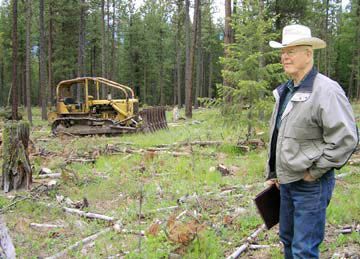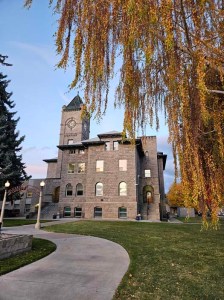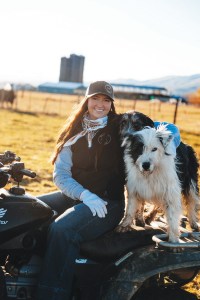COLUMN: A true gentleman: remembering Lyle Defrees
Published 3:40 pm Tuesday, August 5, 2025

- Lyle Defrees on his family's forested property in Sumpter Valley, about 20 miles southwest of Baker City.
Lyle Defrees was one of those fortunate people for whom that great question — where is home? — could have only one answer.
This seems to me a wonderful thing.
How magical that a person can live for more than nine decades, as Lyle did, and always know, when he returned to the Sumpter Valley, when he looked across the hay meadows at the hulking ramparts of the Elkhorns, that he had come home again.
Trending
Albert “Lyle” Defrees died July 27, 2025. He was 91.
I didn’t know him well.
And each of my several conversations with Lyle, dating back a quarter century or so, as best as I can remember, were of a professional nature — interviews, that is.
But I recognized from the first time I met Lyle that he was a true gentleman, a breed which has never been too common and which, I fear, is today even more rare than it once was.
I’ve run across a handful of other Baker County residents through my work who shared with Lyle a wealth of laudable attributes, and I cherish each encounter, a series of fringe benefits whose value can’t be quantified by any of the common measures.
Lyle was wise and he was humble.
Trending
The sort of man who you hope happens by, driving a pickup truck or a tractor, when you get your rig mired in the mud or stuck to its axles in a snowdrift.
A man who will know how to pull you free and who will send you on your way without feeling that you had done anything stupid.
And perhaps with a story of his own travails in the bargain, something to be savored in the remembering.
Lyle was born on Dec. 18, 1933, in his grandparents’ home in McEwen, the town several miles east of Sumpter along the route of the Stump Dodger, the famous narrow-gauge Sumpter Valley Railroad.
He went to school for eight years in McEwen before going on to high school in Baker.
Lyle served in the U.S. Army for two years on active duty, then for 20 years in the National Guard, where he advanced to the rank of major.
Lyle’s parents, Albert and Ellen Defrees, owned a ranch in the Sumpter Valley, near the Powder River. When he was a boy, his parents bought more than a thousand acres of forest, mostly on the slopes of Huckleberry Mountain, which rises south of the valley.
The land had been heavily logged, the thick old ponderosa pines and tamaracks hauled by the Stump Dodger to the mill in Baker.
Over more than half a century, Lyle and his wife, Margaret, later joined by their son, Dean, strived to replicate the forest that grew long before Lyle himself was born. They applied modern forestry techniques but they also relied on photographs as well as on the memories of Lyle’s parents, who started their ranch not long after the turn of the century.
Lyle ran the cattle operation with the same deep affection for the land, that valley whose every nook and cranny he explored as a boy on foot and astride his horse, Fanny.
He didn’t seek attention or renown but it came anyway, as inexorably as the line of snow slinking down the slopes of the Elkhorns with the coming of the fall, from the first dusting on the tips of the peaks to the fence-burying drifts for which this mountain valley is known.
In 2016, the American Tree Farm System picked the Defrees family, out of 74,000 families, as the top tree farmers in the nation. The award honored Dean and Lyle along with Dean’s wife, Sharon Defrees; their daughter, Dallas Hall and her husband, Riley Hall; and Dean and Sharon’s two sons, Nathan Defrees and his wife, Jess Defrees, and Tyler Defrees and his wife, Max Patashnik. The family traveled to Washington, D.C., to accept the honor.
Three years later I was a guest on the Defrees Ranch. A group of officials from the U.S. Natural Resources Conservation Service had come to the ranch to learn how the family protected their land, and in particular its irreplaceable soil, while growing both beef cattle and ponderosa pines.
We sheltered for a spell in a hay barn while a May rain shower pelted the roof. I realized, as I listened to the speakers, that I was sharing that space, fragrant with the sweet scent of grass hay, with four generations of the family. Nathan and Jess’ daughter, Sloan, then three, was playing in the straw.
Lyle, who was 85 on that spring afternoon, made a few comments, leaving most of the presentation to Dean and to others.
But I noticed, as Lyle spoke, that the audience went quiet. It was as though we all recognized that his voice was the true voice of this land, that his connection to this place was unique.
I felt in those moments the great weight of time. I sensed the way in which a person, as the decades accumulate, can attain not immortality, for that must always be beyond our grasp, but something like it, a link to a particular piece of ground as strong as the taproots of the ponderosas, the stolid sedimentary walls of the mountains.
It is a tenet of the code of the West to close any gate that you open, and it is one I always follow.
I have not had the occasion to do right by a gate on the Defrees Ranch.
But if I’m ever afforded the chance, I suspect that I will feel a special thrill when I snug the loop of wire round the post.
A small thing, I suppose.
But we have so few opportunities to honor such men as Lyle Defrees, simply because there are so few like him, that I relish even the prospect of imagining, as I drive away from the gate, that he was there and had acknowledged my gesture of respect with a brief nod in my direction.
Jayson Jacoby is the editor of the Baker City Herald. Contact him at 541-518-2088 or jayson.jacoby @bakercityherald.com.









